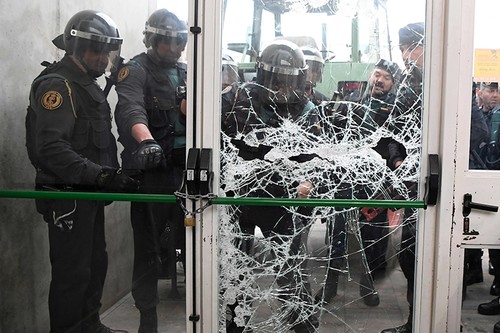Catalans were defying rain and police orders to leave designated polling stations Sunday ahead of a banned referendum on the region's secession that has challenged Spain's political and institutional order.
Spanish riot police smashed their way into a polling station in Catalonia where the regional leader was expected to show up to vote in the disputed independence referendum.

Civil Guard riot police with shields used a hammer to smash the glass of the front door of the voting center and lock cutters to force their way in. Scuffles erupted outside between police and people waiting to vote at the polling center in Sant Julia de Ramis, near the Catalan city of Girona.
Police seized ballot boxes and ballot papers that were to be used in an independence referendum in Catalonia deemed illegal by Madrid, Spain's interior ministry said.
"These are the first ballot boxes and ballots seized by police in Barcelona. Officers are continuing their deployment in Catalonia," Spain's interior ministry said in a Twitter message that included a picture of four plastic ballot boxes and piles of ballots.
"The government today is in a position to affirm that we can celebrate the referendum of self-determination -- not as we wanted, but (it will have democratic) guarantees," government spokesman Jordi Turull told a news conference.
The country's Constitutional Court has suspended the vote and the Spanish central government says it's illegal. Regional separatist leaders have pledged to hold it anyway and have called on 5.3 million eligible voters to cast ballots.
Defiant crowds gathered before dawn Sunday in Barcelona and towns across Catalonia at schools and some of the other 2,315 facilities designated as polling stations. They were joining parents, children and activists who occupied the buildings over the weekend to make sure that polls open at 9 a.m. (0700GMT) on Sunday.
It was unclear how many of the polling stations would be able to open, if any at all. The Ministry of Interior didn't provide a number late on Saturday when it said that "most" of them had been sealed off and that only "some" remained occupied.
Police have received orders to avoid the use of force and only have been warning people to vacate the facilities. They are also supposed to confiscate ballots and ballot boxes.
Activist Augsti Gil said there were no ballots or ballot boxes early Sunday at Barcelona's Joan Fuster high school, where hundreds have gathered ahead of the vote, but he expected them to arrive by the time polls opened.
Tension has been on the rise since the vote was called in early September, crystalizing years of defiance by separatists in the affluent region, which contributes a fifth of Spain's 1.1 trillion-euro economy ($1.32 trillion.)
Spain's 2008-2013 financial crisis and harsh austerity measures fueled frustration in Catalonia for setbacks in efforts to gain greater autonomy, with many Catalans feeling they could do better on their own.
Courts and police have been cracking down for days to halt the vote, confiscating 10 million paper ballots and arresting key officials involved in the preparations. On Saturday, Civil Guard agents dismantled the technology to connect voting stations, count the votes and vote online, leading the Spanish government to announce that holding the referendum would be "impossible."
Joaquim Bosch, a 73 year-old retiree at Princep de Viana high school, where a crowd of 20 people was growing Sunday morning, said he was uneasy about a possible police response to the crowds.
"I have come to vote to defend the rights of my country, which is Catalonia," Bosch said. "I vote because of the mistreatment of Catalonia by Spain for many years."
On Saturday, Spain's foreign minister dismissed the planned vote as anti-democratic, saying it runs "counter to the goals and ideals" of the European Union.
"What they are pushing is not democracy. It is a mockery of democracy, a travesty of democracy," Alfonso Dastis told The Associated Press in an interview.
Dozens of protests have been taking place in Catalonia and across Spain, some to condemn the crackdown on the vote and others supporting the nation's unity against the independence bid.
No minimum turnout has been set for the validity of the vote by Catalan authorities. Regional government officials initially hoped for a turnout greater than the 2.3 million people who voted in a mock referendum in 2014 in which 80 percent favored independence but have recently signaled that they would consider the vote valid with a lower number given the challenges to hold it.
Separatist Catalan leaders have pledged to declare independence from Spain within 48 hours of Sunday's vote if the 'yes' side wins.